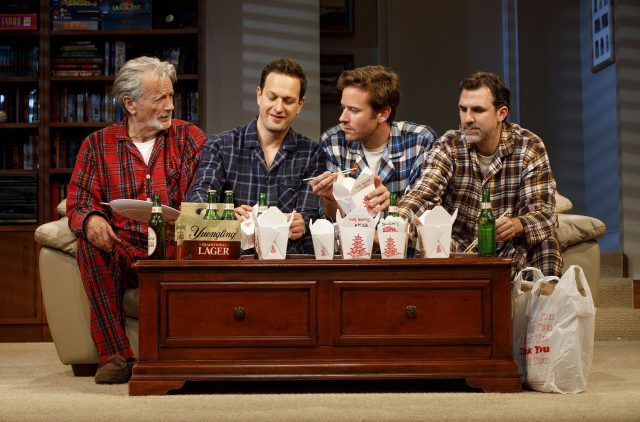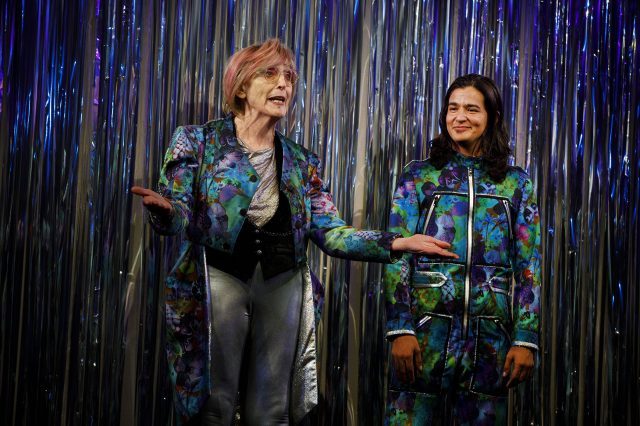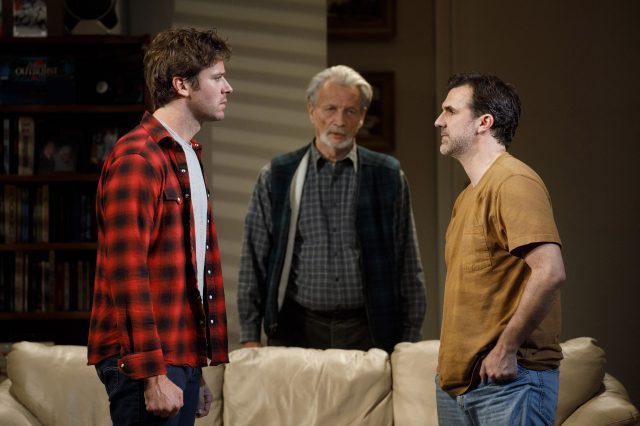
Stephen Payne, Josh Charles, Armie Hammer, and Paul Schneider are the title characters in Young Jean Lee’s Straight White Men (photo by Joan Marcus 2018)
The Hayes Theater
240 West 44th St. between Broadway & Eighth Ave.
Tuesday – Sunday through September 9, $69 – $149
2st.com/shows
Through brilliant bits of added stagecraft, Young Jean Lee and director Anna D. Shapiro have taken Lee’s 2014 Public Theater presentation, Straight White Men, to the next level, transforming it into a more relevant, much funnier Broadway success. The first Asian-American woman to have a play on the Great White Way, Lee, who has previously explored such issues as race, ethnicity, gender, religion, sexual orientation, and body size and image, chooses the setup of an all-straight, all-white, all-male family gathering to celebrate Christmas together — but this time around she has some key twists. As you enter 2nd Stage’s Hayes Theater, which features a glittering shimmer curtain lit by many colors that instantly makes you question what you’re about to see, two flashily dressed people are walking through the crowd, stopping to talk to audience members, asking them whether they like the loud, female rap music or whether it is making them feel uncomfortable. They are known in the script as Person in Charge 1 and Person in Charge 2, played, respectively, by Kate Bornstein and Ty DeFoe. “In case you were wondering, neither of us is a straight white man,” Bornstein, who identifies as a nonbinary Jew from the Jersey Shore, says. DeFoe explains, “I’m from the Oneida and the Ojibwe nations. My gender identity is Niizhi Manitouwug, which means ‘transcending gender’ in the Ojibwe language.” Bornstein and DeFoe form a great comic duo playfully raising issues of comfort and privilege. “Tonight Kate and I are here to try something a little tricky,” DeFoe says. “As foreign as they are to us, we’re gonna try to find some understanding for straight white men. That’s what we wish everyone would do for us.” Lee is not out to skewer straight white men, which has become easy target practice these days, but nor is she out to praise or defend them.

Kate Bornstein and Ty DeFeo are the people in charge of Straight White Men at the Hayes Theater (photo by Joan Marcus 2018)
The shimmer curtain parts to reveal a cozy living room with a couch, a small bar, wall-to-wall carpeting, and other standard elements, nothing fancy. Todd Rosenthal’s set is encased in a large frame, at the bottom of which is a gold plaque that reads: “STRAIGHT WHITE MEN.” It’s as if we’re looking at a human environment in a zoo or a modern historical painting. The inhabitants of this residence are widowed patriarch Ed (Stephen Payne) and his oldest son, Matt (Paul Schneider), a Harvard grad now doing part-time office work for a small charitable organization. Joining them for the holiday are sons Jake (Josh Charles), a divorced banker with kids, and Drew (Armie Hammer), a novelist and teacher who flits about from relationship to relationship. Boys will be boys, so they spend much of the ninety-minute intermissionless production acting out childhood rituals, good-naturedly razzing and annoying one another, and playing a board game called Privilege, adapted by their mother from Monopoly to teach them liberal values. When Jake draws an “Excuses” card, he reads, “‘What I said wasn’t sexist-slash-racist-slash-homophobic because I was joking.’ Pay fifty dollars to the Lesbian and Gay Community Services Center.” Drew next picks up a “Denial” card, reading, “‘I don’t have white privilege because it doesn’t exist.’ Get stopped by the police for no reason and go directly to jail.” All four men later sing Matt’s high school adaptation of the title song from Oklahoma!, which includes such KKK-related lines as “Where we sure look sweet, in white bed sheets / with our pointy masks upon our heads!” The song is delightfully choreographed by Faye Driscoll, who has proved she can energize an audience in such works of her own as the Thank You for Coming trilogy and There is so much mad in me as well as Lee’s Untitled Feminist Show and We’re Gonna Die.

Brothers Drew (Armie Hammer) and Matt (Paul Schneider) face off while their father (Stephen Payne) looks on in Straight White Men (photo by Joan Marcus 2018)
The narrative makes a sharp turn when Matt suddenly starts crying as the men eat their Chinese-food dinner. His brothers and father debate why the prodigal son has broken down, whether it’s because he is depressed about his personal situation, the state of the world, or something else. Matt even refers to himself as a “loser,” that most Trumpian of words. At the heart of the discussion is whether Matt has failed to live up to his potential, whether he has not taken advantage of everything white privilege had to offer him, although that phrase is not used specifically. Knowing that Broadway audiences are primarily white, Tony winner Shapiro (August: Osage County, This Is Our Youth) and two-time Obie winner Lee (The Shipment, Songs of the Dragons Flying to Heaven) don’t skewer the title characters, nor do they ask for any judgment. They just lay it all out there, although the motto for Lee’s theater company (2003-16) was “Destroy the audience.” The manipulations that have been added for the Broadway run are meant to make attendees feel on edge. If an audience member expresses to Bornstein (Gender Outlaw, Kate Bornstein Is a Queer and Pleasant Danger) or DeFoe (Masculinity Max, Clouds Are Pillows for the Moon) that the entrance music is too loud or offensive, for example, one of the options for them is to be led out to the lobby until the show starts; the music is not going to be changed or lowered for anyone.
In addition, at the start of each of the three acts, Bornstein and DeFoe guide some of the actors onto the stage and put them into place, as if carefully re-creating the past, when white men were at the top of the chain. But now the people in charge are nonbinary, gender fluid, able to identify themselves however they want. It’s almost as if the four white men are pawns in their hands, the power dynamic completely reversed; it might come as no surprise that Lee has been a dollhouse maven since she was a lonely Korean-American child, unable to make friends. The Broadway stage has become her dollhouse, where she can design her own world, word by word, character by character, scene by scene. In their Broadway debuts, Charles (The Antipodes, The Distance from Here), Schneider (Bright Star, Goodbye to All That), and Hammer (Call Me by Your Name, Sorry to Bother You) are fully believable as the siblings, whether goofing around or getting serious, never feeling like stereotypes onstage just to make a sociopolitical point. Payne (Superior Donuts, August: Osage County) is about a half beat behind the others, and the role-playing scene is still awkward. But this iteration of Straight White Men feels right at home on the Great White Way, tenderly looking at how things were, how they are, and perhaps how they will be.